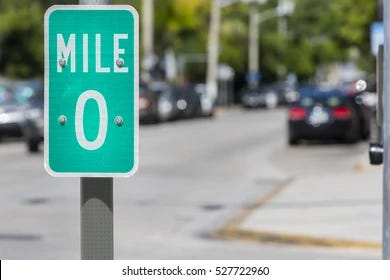Hitting Our Collective Zero Point
“As soon as you hear someone say ‘the new normal,’ plug your ears, and say, ‘bullsh!t.’” - David Farr, CEO, in his Wall Street Journal interview. By Damon D'Amore.
The core tenet of The New Zero™ is that there isn’t and never will be a ‘new normal,’ - a favorite flashcard term of the traditional consultant crowd.
To quote a CEO from a WSJ interview during the COVID pandemic; “As soon as you hear someone say ‘the new normal,’ plug your ears, and say, ‘bullshit.’ ” David Farr, CEO of Emerson Electric Co. said.
Definition: A “Zero Point” is a specific moment in time tied to an event that permanently and with great consequence changed your worldview. These points occur both in the timelines of businesses and in individual lives.
Zero points are irreversible and there is a definitive self-awareness of time, memory and one’s core unbiased identity related to how one interacts with the world and the expectations of those interactions before and after the zero point. These moments can be global in nature (such as a worldwide pandemic) or highly personal and affect only the individual (illness, death of a loved one, etc.).
Later, as time passes when examining important, strategic decisions made after or as a result of the pivotal “Zero” event and connecting the dots looking backwards one can see how that decision would have been different or not made at all, had that Zero Point event not occurred.
These reflections and lessons learned are critical to confident decision-making in future times of uncertainty.
Two Narrative Examples
Two dialogue quotes that speak to the profound effects of both the external events and internal decisions that make up a Zero Point:
In the HBO series True Detective there is a great moment where an adult played by Vince Vaughn is consoling a child who just lost their father, explaining to the child that, due to the significance of the event he’s experiencing in his father’s passing at such a young age, his life will never be the same, essentially describing a zero point in the child’s timeline of their life:
“Sometimes, a thing happens, splits your life. There's a before and after. I got like five of them at this point. And this is your first…But if you use it right, the bad thing, you use it right, and it makes you better. Stronger. It gives you something most people don't have.”
And, about the process of decision-making at Zero Points:
"That moment when what you decide will impact your life forever - you will be a different person. If you do THIS you will forever be diminished or if you do THAT you will forever retain your integrity as a human being."- Actor Tom Sizemore discussing the dynamics of characters in the movie Heat.
Collective Zero Points
While multiple individuals, companies or stakeholders may all experience a Zero Point at the same time those Zero Points are not identical in how they are perceived or affect them. What’s true for everyone is that there is no going back to life or a business environment that existed before the inflection point. To do so would be living and operating in a state of denial.
Denial, a psychological defense mechanism, may have some immediate short-term value at the onset of a crisis, providing mental space for some reasoning and decision making of immediate actions to be taken. However, denial embraced as a longer-term protection device leads to only exponentially worse consequences when one is forced to face their new realities than if they had embraced the chaos and ambiguity at the outset.
Worldviews, mindsets, expectations of oneself and of others and identities at their core all have undergone fundamental changes. One can take lessons from the past, savor or grieve memories of a time before their inflection points and use their Zero Point as a positive driver going forward. But you can never go home.
Not only can you never go back to your reality prior to your Zero Event, that world, those individuals and those circumstances no longer exist - not in the form or value they did.
One of the most important concepts for those seeking to thrive after surviving a Zero Point in their life or business, is the recognition that nothing can ever be what it was. That’s a tough truth for most to acknowledge.
But, as with every could there is a silver lining.
The empowering side of that coin is when an individual mourning the past realizes that it isn’t the actual things (people, culture, business environments, etc.) that they are missing and nostalgic for - it’s the feeling those things brought as a sense of security when all ‘seemed normal.’


